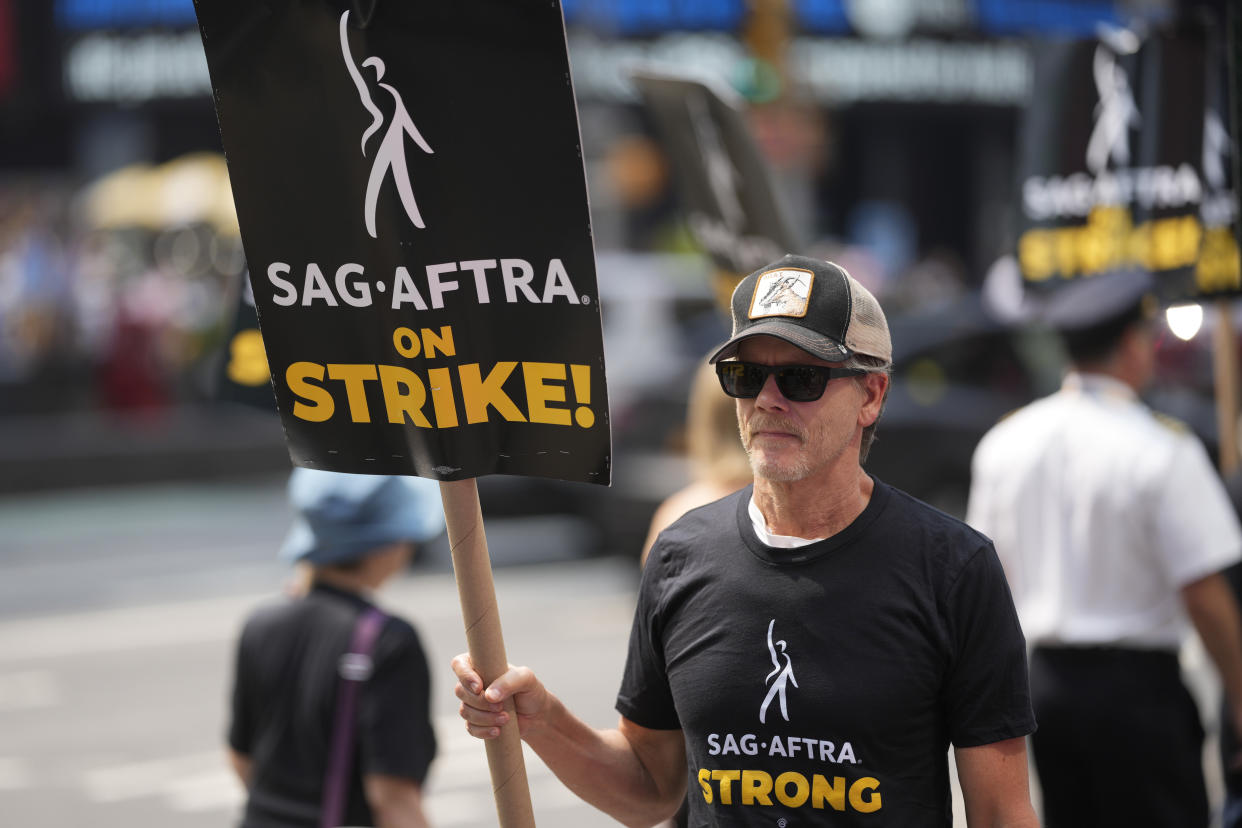Hollywood strikes to hit theaters hard as Netflix remains best-positioned: Moody's
Hollywood's double strike will hit movie theater chains the hardest while streaming-facing companies like Netflix (NFLX) are best-positioned in the event of a prolonged work stoppage, according to a new report by Moody's released on Monday.
SAG-AFTRA — the union that represents approximately 160,000 actors, announcers, recording artists, and other media professionals around the world — joined writers on the picket lines early Friday after the guild failed to negotiate a deal with the Alliance of Motion Picture and Television Producers (AMPTP), which bargains on behalf of studios including Disney (DIS), Netflix (NFLX), Amazon (AMZN), Apple (AAPL), and NBCUniversal (CMCSA).
The stakes couldn't be higher, Moody's warned, predicting "a relatively long strike" which would hit movie theater companies such as AMC Entertainment (AMC) and Cineworld (CINE.L) first, followed by diversified media companies transitioning to streaming amid secular declines in linear television.
"If there is a protracted strike, cinema operators are most at risk with their nearly complete dependency on new product," Moody's said. "Theatrical exhibitors are already strained from damage caused by the COVID pandemic such as lighter release schedules that followed and shortened distribution windowing. They also have mostly weaker balance sheets and credit ratings."
Those in the safe zone? Moody's said Netflix, Comcast, Fox (FOXA) and Sony Group (SONY), along with newer participants like Apple and Amazon, are best-positioned, explaining, "Major studios, network owners and streamers that are well-diversified by business, content genre (news and sports) or by geographic production and library, and have relatively strong balance sheets are least at risk."
Michael Pachter, managing director of equity research at Wedbush, echoed Moody's points in an interview with Yahoo Finance Live on Friday, emphasizing Netflix's ability to pivot amid the strikes.
"Netflix would love this to drag on for five more years," he quipped, adding the studio will "not be the first" to cave to demands given its strong presence overseas, broad breadth of content, and profitable balance sheet. Broadcasters and movie studios, on the other hand, are in "big, big trouble," he said.
The media and entertainment industry today is being dramatically reshaped by the impact of streaming services. Streaming shows often have fewer episodes and come with less residual income compared to traditional network television, which often means less money in the pockets of both actors and writers.
At the same time, the majority of studios are no longer just "pure play" production houses. Rather, they have their own streaming divisions, which have brought on a new set of challenges as direct-to-consumer losses mount.
"Production in the US has halted at a time when the sector is under pressure to mitigate the secular decline in linear TV and show it can operate streaming platforms at a profit to mitigate linear decay," Moody's said. "Two unions on strike highlights the stresses on both sides of the bargaining table. It is not just the revenue share at stake, but how compensation has evolved in the streaming ecosystem."
SAG-AFTRA is fighting for more protections surrounding the role of artificial intelligence in media and entertainment, in addition to higher streaming residuals as more movies and TV shows go direct to streaming. These demands are similar to those posed by the writers' guild.
It is the first time SAG-AFTRA has gone on strike in over four decades and the first time since 1960 that both actors and writers are striking concurrently. The Writers Guild of America (WGA) strike is currently in its third month with no end in sight.

Moody's estimated the newly ratified Directors Guild of America (DGA) contract, which included gains in wages and benefits, a 76% increase in foreign streaming residuals (a type of royalty payment), and a "groundbreaking agreement" confirming AI is not a person, coupled with potential new WGA and SAG-AFTRA contracts will ultimately cost media companies $450 million to $600 million more per year.
Overall, Moody's said studios, networks and streamers were preparing for potential strikes by increasing production and accelerating deadlines to saturate and lengthen their finished content pipelines.
As a result, the firm believes "the strike will be a temporary phenomenon and unlikely to cause the investment-grade companies’ credit quality to weaken significantly enough to pressure their ratings in isolation."
"But it could cause some disruption and ultimately a settlement is highly likely to result in higher costs for all producers and distributors, and potentially for consumers which could moderately hurt subscription growth and churn rates," the report added.
The cracks are already beginning to show. CBS said on Monday it plans to air "Yellowstone" reruns to help fill in the fall TV schedule, which will heavily rely on unscripted reality TV and game shows.
Alexandra Canal is a Senior Reporter at Yahoo Finance. Follow her on Twitter @allie_canal, LinkedIn, and email her at alexandra.canal@yahoofinance.com
Click here for the latest stock market news and in-depth analysis, including events that move stocks
Read the latest financial and business news from Yahoo Finance
